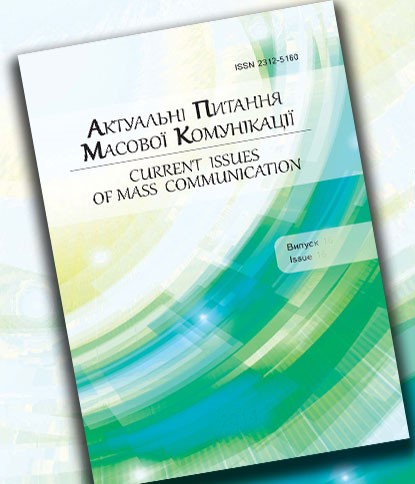Про журнал
ISSN 2786-4502 (Online)
ISSN 2312-5160 (Print)
«Актуальні питання масової комунікації» – рецензоване фахове наукове видання Навчально-наукового інституту журналістики Київського національного університету імені Тараса Шевченка. Журнал публікує оригінальні, закінчені роботи за результатами досліджень із масової комунікації, що відображають сучасні тенденції розвитку галузі в Україні та світі, закономірності, процеси, структури та форми масовокомунікаційних відносин. Пріоритет надається актуальним для української та світової аудиторії дослідженням масовокомунікаційних трендів у розвитку технологій, медіа, журналістики, видавничої справи, реклами, зв’язків з громадськістю, соціальної інформатики, документознавства, бібліотекознавства тощо.
Ключові слова профілю журналу: масова комунікація, аудиторія, медіавпливи на аудиторію, медіаефекти в аудиторії, технології впливу на аудиторію, медіа як інститут впливу на аудиторію, маси, публіка, натовп. До ключових слів профілю журналу можна відносити близькі за змістом слова та словосполучення до тих, що тут наведено.
Наш журнал має такі рубрики:
Дискусії та обговорення (друк науково-публіцистичних виступів, позицій редакції, головного редактора, членів редколегії, результатів досліджень, які не пройшли рецензування, але становлять інтерес. Ці публікації не є науковими статтями).
Огляди (друк оглядів наукової літератури з того чи іншого питання. Огляди є видом наукової статті. Друкуються тільки англійською мовою (подання може бути й українською мовою).
Дослідницькі статті (друк результатів наукових досліджень, що відповідають профілю журналу, пройшли рецензування і схвалені до друку як наукові статті). Друкуються тільки англійською мовою (подання може бути й українською мовою).
Міждисциплінарні дослідження (друк наукових статей, що пройшли рецензування, подають оригінальні результати досліджень, але виходять за межі вузького профілю журналу, а їхні автори є ученими з інших галузей. Проте такі наукові статті повинні бути хоч частково пов’язані з питаннями масової комунікації). Друкуються тільки англійською мовою (подання може бути й українською мовою).
Сторінка Лабораторії прихованих медіаефектів (друкуються емпіричні статті, що є звітами про результати, зокрема, експериментальних досліджень, які проводять працівники Лабораторії прихованих медіаефектів кафедри соціальних комунікацій Навчально-наукового інституту журналістики. Рішення про друк цих статей приймає команда дослідників лабораторії. У цьому розділі можуть друкуватися статті авторів з-поза меж лабораторії, але тільки за рішенням працівників лабораторії, якщо тематика таких статей відповідає інтересам лабораторії). Статті друкуються тільки англійською мовою (подання може бути й українською мовою).
Рецензії (друк рецензій на різні наукові видання у галузі масової комунікації, включаючи рецензії на наукові статті, відгуки опонентів на дисертації).

Ми повністю дотримуємося вимог стандарту APA, викладеного у Публікаційному посібнику Американської психологічної асоціації, 7 вид. (Publication Manual of the American Psychological Association (APA), 7th Edition), коли мова йде про структуру статей, їх види, оформлення. Основні купюри з цієї книги дивіться тут.
Ми дотримуємося такої класифікації статей: емпіричні статті (якісні та кількісні статті) з кількісними, якісними та змішаними методами дослідження та реплікації (реплікаційні статті) . Ці журнальні статті повідомляють про первинні або оригінальні дослідження, тобто дослідження, які раніше офіційно не публікувалися. Теоретичні статті та методологічні статті не представляють дослідження, а описують досягнення в теоріях чи методах. Журнальні статті, що розглядають або синтезують результати первинних досліджень, включають огляди літератури і кількісні та якісні метааналізи. У тематичних розділах журналу можуть публікуватися різні типи статей, тому у розділі Категорія на сайті ми маркуємо тип статті.
Засновано у 2000 році. До 2021 року включно журнал (випуски 1 - 30) був на сторінці http://comstudies.org/.
Засновник



















